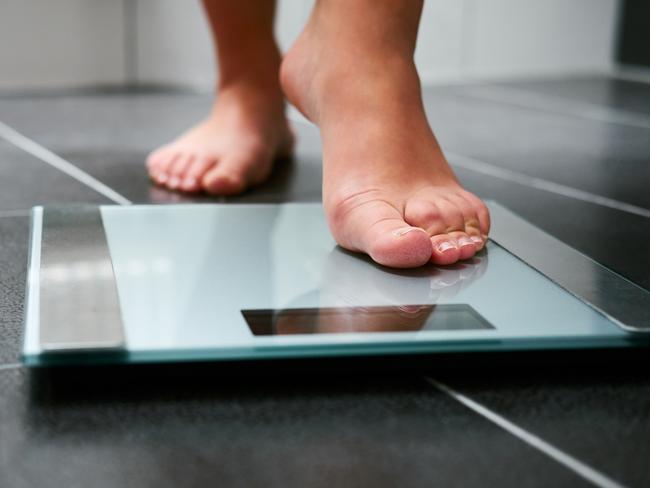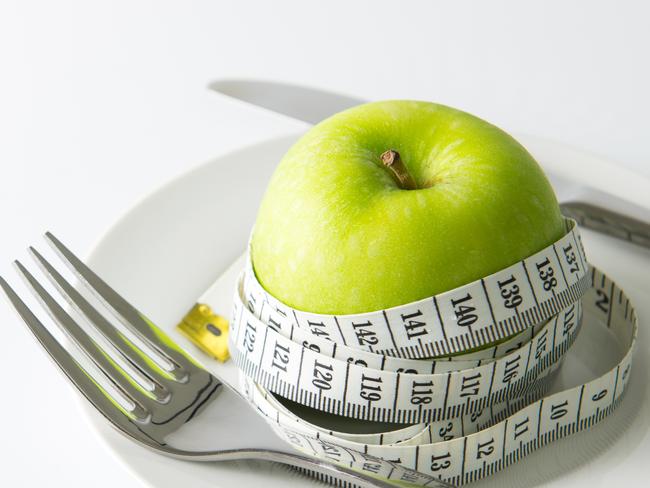How to hack your hormones to lose weight
Hormones are responsible for everything from controlling your appetite to energising your cells, and play a major role in how your body uses and stores fat. Rebalancing your hormones can help you lose those stubborn kilos. Here the expert reveals how.
Body+Soul Daily
Don't miss out on the headlines from Body+Soul Daily. Followed categories will be added to My News.
Been pounding the pavement and drinking green juice every day but still not seeing any results? Your hormones may be to blame.
Responsible for everything from controlling your appetite to energising your cells, hormones play a major role in how your body uses and stores fat.
When they’re working well, these little messengers can help you shed excess kilos and help you maintain your goal weight, but when they’re thrown out of whack — by your diet, training style or stress levels — they can stall or reverse your progress.

If you suspect you’re experiencing a hormonal imbalance, keep a diary of your symptoms and make an appointment with your GP or naturopath.
Although a single test can’t assess all your hormone levels, a doctor will request diagnostic blood tests for any that might be out of order.
MORE FROM BODY+SOUL:
GET INTO YOUR BEST SHAPE IN EVERY DECADE
CELEBS INSPIRING STRENGTH AMONG ADVERSITY
Once you have a better idea of where your body may need some help, get your internal chemistry back on track with these hormone-balancing tips from naturopath and Healthy Hormones co-author Belinda Kirkpatrick.
CORTISOL
WHAT IT DOES: “Cortisol is one of your body’s major stress hormones,” explains Kirkpatrick.
“It provides your body with energy in times of stress, but it also increases your appetite and slows your metabolism. If you have prolonged periods of stress — and prolonged production of cortisol — you’re likely to experience weight gain [especially around your stomach] and have trouble shifting the kilos.”
HOW TO HACK IT
1. RELAX
It’s OK to say no to a social meet-up every now and then, and use the time to unwind and practise some relaxing breathing techniques, says Kirkpatrick.
“You can’t be in fight-or-flight mode when you breathe deeply, so when you’re feeling overwhelmed, stop and take 10 deep breaths to activate your parasympathetic nervous system, which switches off that fight-or-flight feeling.”
2. DO LESS HIIT
High-intensity interval training can be an effective weight-loss strategy, but if you overdo it, the cortisol it produces can make your body cling to fat instead of torching it. Instead, Kirkpatrick advises:
“Supplement your tougher workout sessions with a rest day or more gentle exercises like walking and yoga.”

3. SWITCH TO DECAF
Too much caffeine can increase your cortisol levels, says Kirkpatrick. To keep your levels in check — and to ramp up your body’s fat-burning abilities — swap your afternoon coffee for a decaf or herbal tea.
TESTOSTERONE
WHAT IT DOES: “Testosterone plays a key role in muscle development and fat suppression, so if your levels are low, you might notice you’re not getting the muscle growth or weight loss you’d expect from your workouts,” explains Kirkpatrick.
Women with Polycystic Ovarian Syndrome (PCOS) may have high testosterone levels, which can also lead to weight gain, so the key is to rebalance your levels.
HOW TO HACK IT
1. PUMP SOME IRON
Low testosterone levels can result in low muscle mass. To boost your production, Kirkpatrick recommends eating more protein and adding weight training to your
gym routine — especially if your current regimen is dominated by walking, running and other forms of cardio exercise.
2. CHECK YOUR CONTRACEPTION
“The Pill suppresses the production of testosterone, and although this can clear up your skin, the drop in testosterone can also slow down weight loss,” says Kirkpatrick. If you’re packing on the kilos despite eating clean and working out, ask your GP for a blood test to determine your levels.
3. LOAD UP ON ZINC
Zinc can normalise your testosterone levels by blocking an enzyme that converts testosterone into oestrogen.
“It can also reduce the testosterone levels in women with PCOS without pushing it out of a healthy range.”
OESTROGEN
WHAT IT DOES: Oestrogen is vital for women’s reproductive health and when it’s too high, it can cause weight gain around the tummy, hips and bum.
However, while high levels are an issue for pre-menopausal women, Kirkpatrick warns: “A drop in oestrogen in post-menopausal women can also contribute to weight gain.”
The goal, therefore, is to work to rebalance your oestrogen levels.

HOW TO HACK IT
1. AVOID EXCESS CHEMICALS
“Everyday items like perfumes, plastics and personal-care products can contain chemicals that mimic oestrogen and make your body think your oestrogen levels are higher,” she warns.
“To limit your exposure, try making the switch to natural cleaning and personal-care products, and avoid plastics.”
2. MIND YOUR GUT
“Oestrogen can be produced and metabolised in the gut,” says Kirkpatrick.
“So if you have an imbalance in your gut bacteria, your oestrogen production can be affected. To support a healthy gut, ensure you consume fibre from fruit, vegetables, wholegrains and legumes, and eat fermented foods.”
3. BALANCE YOUR PROGESTERONE
“Oestrogen and progesterone work like a see-saw,” Kirkpatrick explains.
“If you bump up your progesterone, it can help reduce oestrogen. You can do this by lowering your stress levels and boosting your intake of zinc and vitamins B6 and C, which are found in colourful fruit and vegetables, and oily fish.”
LEPTIN
WHAT IT DOES: “Leptin is produced by your body’s fat cells and it signals your brain to increase energy expenditure and decrease appetite in order to regulate your body weight,” Kirkpatrick explains.
“If leptin levels become too high, you can become leptin-resistant, which means your body no longer responds to those appetite-reducing signals and stops burning energy.”

HOW TO HACK IT
1. STOP THE SNACKING
“Snacking can lead to leptin resistance, so the best thing to do is limit your eating times to three small meals a day,” Kirkpatrick explains.
2. REDUCE INFLAMMATION
Inflammation can contribute to leptin resistance, so Kirkpatrick advises reducing your leptin levels by avoiding sugar and processed grains, increasing your intake of green vegetables, adding turmeric to your food daily and taking a good-quality fish-oil supplement.
3. SWEAT IT OUT
University of Cincinnati data has shown that exercise can cut leptin resistance. So — unlike with cortisol — Kirkpatrick says HIIT training is actually the best exercise for leptin resistance, but also warns against not overdoing things.
INSULIN
WHAT IT DOES: “When insulin is working well, it binds to glucose and delivers it to your cells so they can have energy,” says Kirkpatrick.
“When insulin levels are too high, the cells reject the glucose and it’s stored as fat throughout your body.”
Too much insulin in the blood can also cause insulin resistance, which can lead to diabetes and cause fat to accumulate around your mid-section.
HOW TO HACK IT
1. DITCH REFINED CARBS
“Although protein can stimulate insulin release, carbohydrates are the main culprits,” Kirkpatrick explains.
“To keep your levels on track, reduce your intake of refined sugars and carbs, make protein and vegetables the stars of every meal, and choose wholegrain carbs like seedy bread and brown rice.”
2. TRY RESISTANCE TRAINING
According to Kirkpatrick, weight training can decrease insulin resistance and up your body’s energy burn.
“Walking isn’t quite enough,” she says.
“Increasing muscle mass with resistance training is what you’re looking for.”

3. DRINK CINNAMON TEA
“Cinnamon tea can help lower blood-sugar levels by imitating the effects of insulin and increasing the intake of glucose into the cells,” says Kirkpatrick.
“Aim for two cups of cinnamon tea most days or look for a supplement containing cinnamon and the mineral chromium.”
GHRELIN
WHAT IT DOES: “Ghrelin is an appetite-increasing hormone that can override the signals your gut sends to the brain that tell you to stop eating,” Kirkpatrick says.

“If you’re not eating enough or you’re stressed, ghrelin output increases and this can lead to weight gain.”
HOW TO HACK IT
1. DO MORE HIIT
Interval training like HIIT maintains your ghrelin levels. Increased muscle mass is also associated with lower ghrelin production, so be sure to also add a few weights sessions to your routine.
2. NOSH ON PROTEIN
“Regular eating can help stabilise your ghrelin levels, as can eating enough protein, so make sure you’re consuming 1-1.5g of protein per kilogram of body weight every day,” adds Kirkpatrick.
3. CLOCK MORE SLEEP
Ghrelin levels decrease when you sleep as your body doesn’t need as much energy. If you don’t sleep enough, you can end up with too much ghrelin in your body, which will only make you feel more hungry.
Originally published as How to hack your hormones to lose weight


